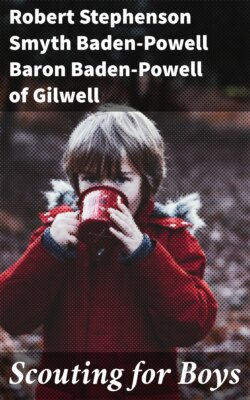Читать книгу Scouting for Boys - Robert Stephenson Smyth Baden-Powell Baron Baden-Powell of Gilwell - Страница 11
На сайте Литреса книга снята с продажи.
CAMP FIRE YARN.—No. 1.
MAFEKING BOY SCOUTS.
ОглавлениеWe had an example of how useful Boy Scouts can be on active service, when a corps of boys was formed in the defence of Mafeking, 1899-1900.
Mafeking, you may remember, was quite a small ordinary country town out on the open plains of South Africa.
Nobody ever thought of its being attacked by an enemy any more than you would expect this town (or village) to be attacked—the thing was so improbable.
But it just shows you how you must be prepared for what is possible, not only what is probable in war; and so, too, we ought to be prepared in Britain against being attacked by enemies; for though it may not be probable, it is quite as possible as it was at Mafeking; and every boy in Britain should be just as ready as those boys were in Mafeking to take their share in its defence.
Well, when we found we were to be attacked at Mafeking, we told off our garrison to the points that they were to protect—some 700 trained men, police, and volunteers. And then we armed the townsmen, of whom there were some 300. Some of them were old frontiersmen, and quite equal to the occasion; but many of them, young shopmen, clerks, and others, had never seen a rifle before, and had never tried to learn to drill or to shoot, and so they were hopelessly at sea at first. It is not much fun to have to face an enemy who means to kill you, when you have never learned to shoot.
Every boy ought to learn how to shoot and to obey orders, else he is no more good when war breaks out than an old woman, and merely gets killed like a squealing rabbit, being unable to defend himself.
Altogether, then, we only had about a thousand men all told to defend the place which contained 600 white women and children, and about 7,000 natives, and was about five miles round.
Lord Edward Cecil and Boy Scouts in Mafeking.
Every man was of value, and as their numbers gradually got less, owing to men getting killed and wounded, the duties of fighting and keeping watch at night got harder for the rest. It was then that Lord Edward Cecil, the chief staff officer, got together the boys in the place and made them into a cadet corps, put them in uniform and drilled them; and a jolly smart and useful lot they were. We had till then used a large number of men for carrying orders and messages and keeping look-out, and acting as orderlies and so on. These duties were now handed over to the boy cadets, and the men were released to go and strengthen the firing line.
And the cadets, under their serjeant-major, a boy named Goodyear, did right good work, and well deserved the medals which they got at the end of the war. Many of them rode bicycles, and we were thus able to establish a post by which people could send letters to their friends in the different forts, or about the town, without going out under fire themselves; and we made postage stamps for these letters which had on them a picture of a cadet bicycle orderly.
Stamp.
I said to one of these boys on one occasion, when he came in through rather a heavy fire: "You will get hit one of these days riding about like that when shells are flying." And he replied: "I pedal so quick, sir, they'd never catch me." These boys didn't seem to mind the bullets one bit; they were always ready to carry out orders, though it meant risk to their life every time.
Would any of you do that? If an enemy were firing down this street, and I were to tell one of you to take a message across to a house on the other side, would you do it? I am sure you would. But probably you wouldn't much like doing it.
But you want to prepare yourself for it beforehand. It's just like taking a header into cold water; a fellow who is accustomed to bathing thinks nothing of it; he has practised it over and over again, but ask a fellow to do it who has never practised it and he will funk it.
So, too, with a boy who has been accustomed to obey orders at once, whether there is risk about it or not; the moment you order him to do a thing on active service, no matter how great the danger is to him he does it, while another chap who has never cared to obey would object, and would then be despised as a coward even by his former friends.
But you need not wait for war in order to be useful as a scout. As a peace scout there is lots for you to do any day, wherever you may be.
